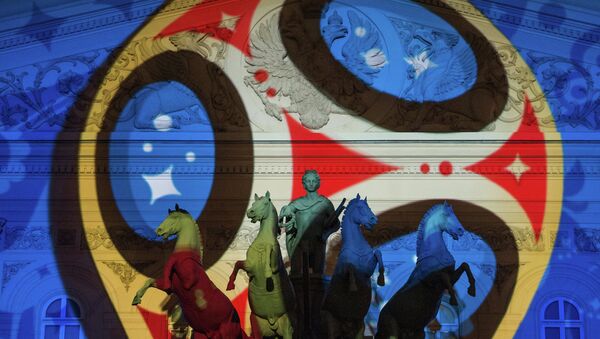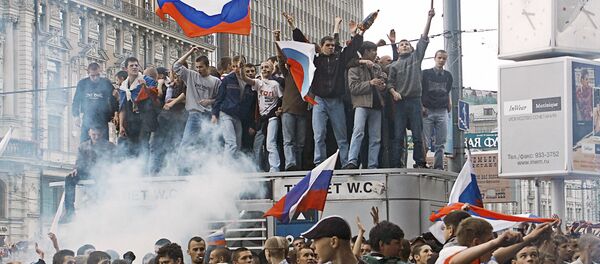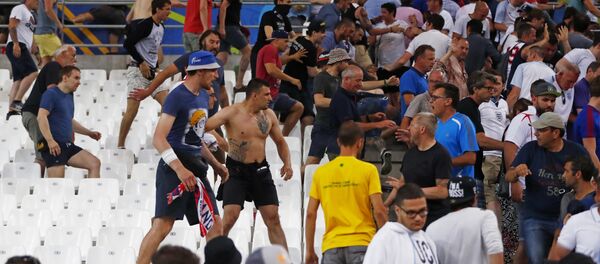Russians are coming!
The documentary opens with an analysis of last year’s clashes that flared up after a UEFA Euro game in Marseille where some 200 Russian fans took on thousands of English fans.
“They pounded away like crazy, mobbing and kicking people,” added another.
The viewers are made to believe that the Russian hooligans’ violent behavior had been “authorized” by senior officials back home.
The authors even try to draw a line between the rampaging hooligans and President Putin who they claim is chummy with the notorious leader of the Russian Football Fans’ Union Alexander Shprygin.
Interviewed by the film’s author, Vasiliy Stepanov, former leader of the Spartak Moscow supporters group “Spartak Gladiators,” who appears in the BBC 2 documentary, says that he was watching the clashes in Marseille on TV and wished he was there. He said that though heavily outnumbered, the Russian hooligans still managed to “kick the English ultras’ asses,” and, clearly meant as a joke, adds that they were acting on “Putin’s orders.”
Lessons learned
Meanwhile, Russian security experts say that Russian police have learned to deal with rioting fans after the Marseille-like events on Manezhnaya square in downtown Moscow following the Russian national squad’s defeat against Japan in 2002.
The law enforcers learned their lesson and when similar clashes erupted on the same square in 2010 they quickly sealed off the square and forced the rampaging mob to disperse.
The more aggressively-minded fans of rival teams are kept apart during and after games.
The BBC documentary makes no mention of all these things though. Instead, it shows images of violent scuffles in Marseille the game’s organizers failed to prevent.
“It was a complete fiasco on the part of the French security services and organizers of Euro 2016. They shouldn’t have allowed 50,000 drunken English fans to gather on a tiny spot at the local seaport. French police had problems with those guys and the Russian fans were definitely provoked by them,” Vasily Stepanov told Sputnik.
“Spotters” and “Ciceros”
Watching the BBC documentary one gets the impression that security during football matches in “Putin’s Russia” is all about long lines of cops with dogs and that all that is being done in the lead-up to the 2018 World Cup is construction of new stadiums.
Meanwhile, work with domestic and foreign fans is done here fully in line with European principles and agreements.
“After Euro 2016 we identified 146 people from 12 Russian regions who took part in the Marseille clashes. During the next two years they will be closely watched by their local police departments,” police Lt. Col. Yuri Isayev said.
Soon there will be foreign police football “spotters” accompanying foreign teams who come to play in Russia to single out the most aggressive of their own fans and work in close cooperation with “Ciceros” – Russian police operatives well informed about the situation on the ground and able to quickly respond to contingencies.
There is a network of national information centers, one of which is already at work in Russia, ensuring close coordination between European football federations.
“Celebration or violence”
The BBC documentary could leave many British fans wondering about the fate awaiting them in Russia. Apparently aware of their jitters, a masked representative of a fan firm in Rostov-on-Don says: “It will be a football celebration for some and violence for others.”
“As for those willing to fight, they will have to do it in the woods,” he warns.
“He who comes here with a sword will die by the sword,” adds another masked Russian fan in another episode, clearly hinting that Russian hooligans will not be the first to pick up a fight.
What really awaits foreigners in Russia
Russian fans spoke about the friendly welcome they were going to accord the foreign fans coming to the 2018 World Cup in Russia.
“I’m sure that we are going to have a top-notch championship thanks to good organization and our law enforcers who know how to learn from other people’s mistakes,” Vasily Stepanov told Sputnik.
“All reasonable and active members of the so-called “football subculture will either be watching the games on TV or will take their families to the stadium to enjoy beautiful and quality football. We’re not looking for trouble,” he emphasized.
Never miss a story again — sign up to our Telegram channel and we'll keep you up to speed!




